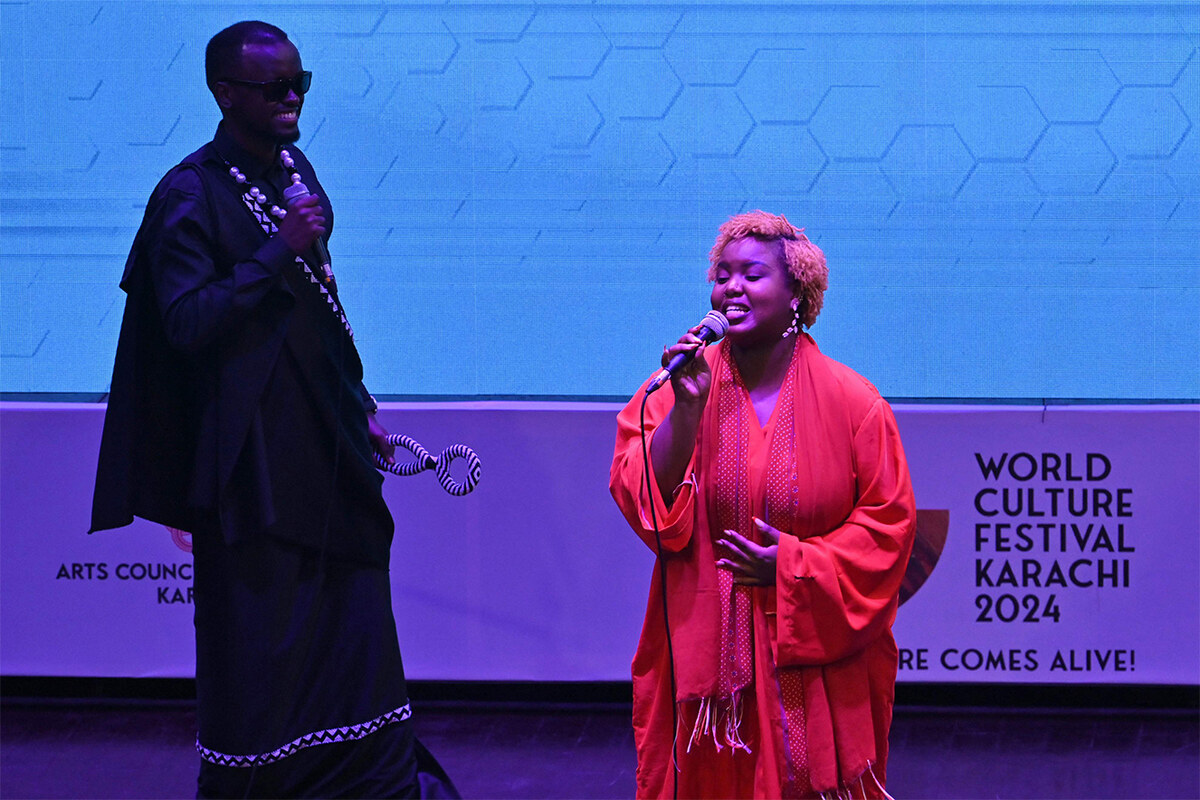KARACHI: Over 400 artists from 40 countries are set to participate in Pakistan’s first World Culture Festival that started in Karachi on Thursday, with a top official from the Arts Council of Pakistan (ACP) saying the event will project the country’s soft image and highlight its “peace-loving” nature.
The inaugural ceremony featured international artists from Rwanda, Azerbaijan, South Africa, and Nepal, with a series of performances beginning with Pakistan’s music maestro Farhan Rais Khan on the sitar, a traditional string instrument, alongside his troupe.

Artists from South Africa perform during the opening ceremony of the World Culture Festival at Arts Council of Pakistan in Karachi on September 26, 2024. (AFP)
The festival will run for a little more than a month until October 30. In addition to Pakistan, artists from the UAE, Oman, Qatar, Palestine, Egypt, Bangladesh, China, Germany and Sri Lanka will also perform throughout the event.
“I believe in the power of culture, art and music,” ACP President Muhammad Ahmed Shah said while addressing the inaugural ceremony. “I want to showcase the talent of my country. More than 300 musicians from Pakistan are a part of this festival.”

Rwandan musicians Peace Jolis (L) and Lee Dia perform during the opening ceremony of the World Culture Festival at Arts Council of Pakistan in Karachi on September 26, 2024. (AFP)
Shah said he was proud of Pakistan’s culture and heritage, adding it was important to change the country’s perception on the global level.
“We want to show the world that Pakistanis are the most peace-loving people,” he continued. “Pakistani artists are no less than anyone else across the world.”
The opening ceremony had Pakistani and international artists in attendance, in addition to dignitaries and media personnel. Governor of Sindh Kamran Tessori was present at the occasion as chief guest.
The evening had a performance from Azerbaijan, featuring artists Sahib Pashazade and Kamran Karimov. The presentation reflected the rich cultural heritage of their country.
“We are very excited to be a part of this festival,” Pashazade told Arab News. “We will be performing with the Azerbaijan Tar [a long-necked, plucked lute] which is included in UNESCO’s heritage … We will also be playing the Azerbaijan Mugham [a classical composition from the Central Asian state] which too is part of UNESCO’s heritage.”

Sahib Pashazade from Azerbaijan plays a Tar string musical instrument during the inaugural of the World Cultural Festival in Karachi, Pakistan, on September 26, 2024. (REUTERS)
“I want to thank the people of Pakistan,” he added. “Their kindness and hospitality inspire us a lot. We are also a Muslim country. Azerbaijan is Pakistan’s brother country. We can relate to the experience, feelings and emotions of the people here. Cultural exchanges are very important in bringing nations together.”
Noor ul Hassan, who is the first Pakistani actor to star in the first season of the Pakistani-Turkish production “Selahaddin Eyyubi,” was also present at the occasion.
“This is the first time [such a festival is] happening in Karachi,” he said while speaking to Arab News. “During the 90s, we used to have Rafi Peer Theatre Workshop. They were the pioneers. I have attended so many of their festivals myself.”
Hassan said he used to work as a freelance theater manager with Rafi Peer during that period. Its events were held annually and brought together a host of foreigners with whom the local would mingle and learn from.
“Then the circumstances changed due to terrorism and lawlessness,” he added. “I am glad this revival is happening … The work that the Arts Council of Pakistan is doing in Karachi should take place in the entire country.”















